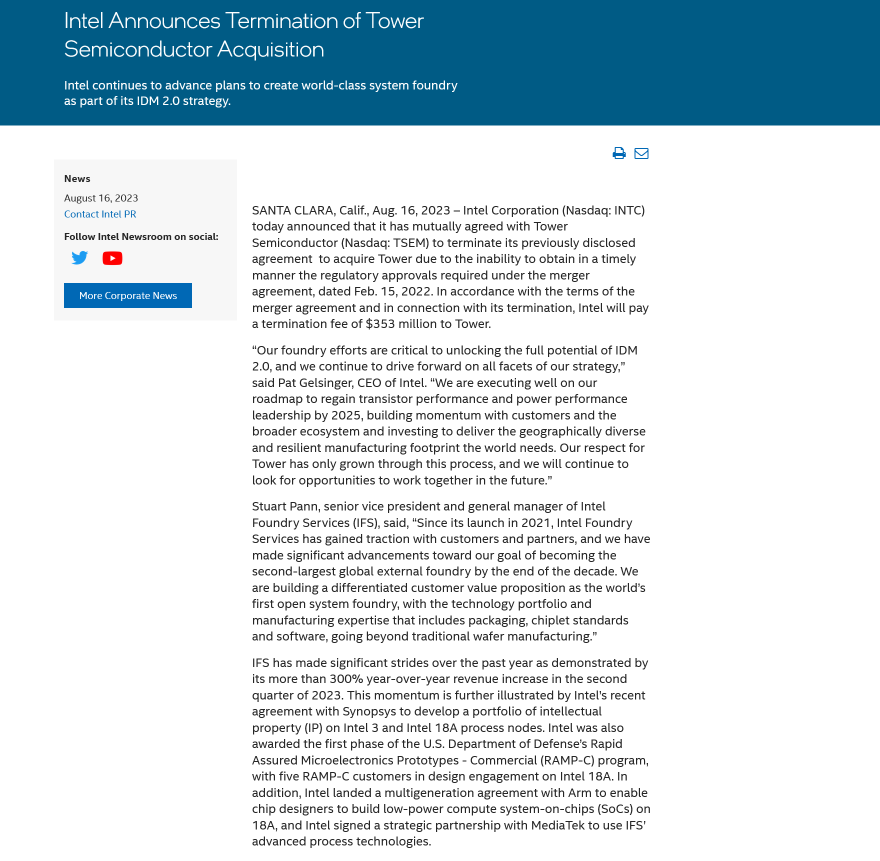Intel Announces Termination of Acquisition of High Tower Semiconductor
Intel announced that due to failure to obtain timely regulatory approval, the company will abandon its plan to acquire Tower Semiconductor Ltd. and abandon the $5.4 billion transaction.Intel Corporation stated in a statement on Wednesday that both parties have agreed to terminate the February 2022 agreement with Tower. According to the terms of the merger agreement, Intel will pay a termination fee of $353 million to Gaota.
Intel CEO Pat Gelsinger stated: Our OEM work is crucial for unleashing the full potential of IDM 2.0, and we will continue to advance all aspects of our strategy. We are well executing our roadmap to regain leadership in transistor and power performance by 2025, building momentum with customers and a wider ecosystem, and investing in providing the geographic diversity and resilient manufacturing footprint needed globally. In this process, we are committed to R's respect is increasing day by day, and we will continue to seek opportunities for cooperation in the future
Stuart Pann, Senior Vice President and General Manager of Intel wafer foundry services (IFS), stated: Since its launch in 2021, Intel wafer foundry services have received support from customers and partners, and we have made significant progress in achieving our goal of becoming the world's second largest external wafer foundry by 2020. As the world's first open systems foundry, we are building differentiated customer value propositions, our technology portfolio, and manufacturing expertise, including packaging, chiplet standards, and software, surpassing Traditional wafer manufacturing has been replaced
It is reported that IFS has made significant progress in the past year, with revenue increasing by over 300% year-on-year in the second quarter of 2023. Intel recently reached an agreement with Synopsys to develop an intellectual property (IP) combination for Intel 3 and Intel 18A process nodes, further demonstrating this momentum. Intel also obtained the first phase of the US Department of Defense Rapid Assurance Microelectronics Prototype Commercial (RAMP-C) program, participating in the design of Intel 18A with five RAMP-C customers. In addition, Intel and ARM have reached multiple generation agreements, enabling chip designers to build low-power computing system chips (SOC) on the 18A. Intel has also signed a strategic partnership with MediaTek to use advanced IFS process technology.

According to Bloomberg, the acquisition of Tower is the cornerstone of Intel CEO Pat Gelsinger's plan to enter the fast-growing semiconductor industry, which is dominated by TSMC in the OEM market. Gaota's influence in this field is relatively small - the company produces chips for customers on a contract basis, but has the professional knowledge and customers that Intel lacks.
When the transaction was initially announced, Intel stated that it would take "approximately 12 months" to complete. As of October last year, the chip manufacturer stated its goal of completing transactions in the first quarter of 2023, but later warned in March this year that the date may be postponed to the second quarter.
The increasingly tense situation between China and the United States has made it increasingly difficult for transactions that require regulatory approval from Beijing and Washington, especially those involving semiconductors, which are a key area of friction in Sino US relations.
Although Tower's scale is only a small part of Intel and TSMC in terms of revenue, it actively produces traditional types of chips for major customers such as Broadcom. Intel's plan is to merge the factories in its network as Tower customers age. Although they do not require the most advanced production technology required by Intel or NVIDIA processors, these old factories can produce many new chips for markets such as electric vehicles.
Investors have discounted the likelihood of the transaction being completed. Compared to the general rise in chip stocks, Gaota's US listed stocks have fallen by 22% this year.
When the transaction was initially announced, Intel stated that it would take "approximately 12 months" to complete. As of October last year, the chip manufacturer stated its goal of completing transactions in the first quarter of 2023, but later warned in March this year that the date may be postponed to the second quarter.
The increasingly tense situation between China and the United States has made it increasingly difficult for transactions that require regulatory approval from Beijing and Washington, especially those involving semiconductors, which are a key area of friction in Sino US relations.
Although Tower's scale is only a small part of Intel and TSMC in terms of revenue, it actively produces traditional types of chips for major customers such as Broadcom. Intel's plan is to merge the factories in its network as Tower customers age. Although they do not require the most advanced production technology required by Intel or NVIDIA processors, these old factories can produce many new chips for markets such as electric vehicles.
Investors have discounted the likelihood of the transaction being completed. Compared to the general rise in chip stocks, Gaota's US listed stocks have fallen by 22% this year.